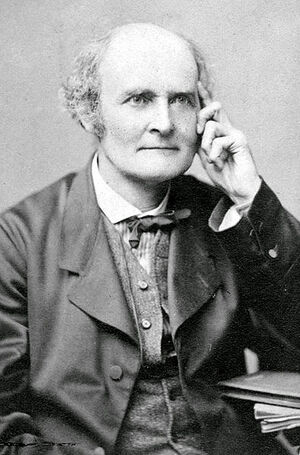Arthur Cayley (nonfiction): Difference between revisions
(Created page with "thumb|Arthur Cayley.'''Arthur Cayley''' F.R.S. (/ˈkeɪli/; 16 August 1821 – 26 January 1895) was a British mathematician. He helped found the mod...") |
No edit summary |
||
| (5 intermediate revisions by the same user not shown) | |||
| Line 1: | Line 1: | ||
[[File:Arthur_Cayley.jpg|thumb|Arthur Cayley.]]'''Arthur Cayley''' F.R.S. (/ˈkeɪli/; 16 August 1821 – 26 January 1895) was a British mathematician. He helped found the modern British school of pure mathematics. | [[File:Arthur_Cayley.jpg|thumb|Arthur Cayley.]]'''Arthur Cayley''' F.R.S. (/ˈkeɪli/; 16 August 1821 – 26 January 1895) was a British [[Mathematician (nonfiction)|mathematician]]. He helped found the modern British school of pure mathematics. | ||
As a child, Cayley enjoyed solving complex maths problems for amusement. He entered Trinity College, Cambridge, where he excelled in Greek, French, German, and Italian, as well as mathematics. He worked as a lawyer for 14 years. | As a child, Cayley enjoyed solving complex maths problems for amusement. He entered Trinity College, Cambridge, where he excelled in Greek, French, German, and Italian, as well as mathematics. He worked as a lawyer for 14 years. | ||
On October 3, 1842, Cayley was admitted to fellowship at Trinity College, Cambridge, at age 21, younger than any other fellow at the College. | |||
He postulated the Cayley–Hamilton theorem—that every square matrix is a root of its own characteristic polynomial, and verified it for matrices of order 2 and 3. | He postulated the Cayley–Hamilton theorem—that every square matrix is a root of its own characteristic polynomial, and verified it for matrices of order 2 and 3. | ||
| Line 13: | Line 16: | ||
== Fiction cross-reference == | == Fiction cross-reference == | ||
* [[Crimes against mathematical constants]] | |||
* [[Gnomon algorithm]] | |||
* [[Gnomon Chronicles]] | |||
* [[Mathematician]] | |||
* [[Mathematics]] | |||
== Nonfiction cross-reference == | == Nonfiction cross-reference == | ||
* [[H. F. Baker (nonfiction)]] - Student | |||
* [[Carl Wilhelm Borchardt (nonfiction)]] | |||
* [[Cayley's mousetrap (nonfiction)]] | |||
* [[George Cayley (nonfiction)]] - Cousin | |||
* [[Andrew Forsyth (nonfiction)]] - Student | |||
* [[William Hopkins (nonfiction)]] - Academic advisor | |||
* [[Mathematician (nonfiction)]] | * [[Mathematician (nonfiction)]] | ||
* [[Mathematics (nonfiction)]] | |||
* [[George Peacock (nonfiction)]] - Academic advisor | |||
* [[Charlotte Scott (nonfiction)]] - Student | |||
* [[James Joseph Sylvester (nonfiction)]] - Friend | |||
External links: | External links: | ||
Latest revision as of 11:10, 7 March 2019
Arthur Cayley F.R.S. (/ˈkeɪli/; 16 August 1821 – 26 January 1895) was a British mathematician. He helped found the modern British school of pure mathematics.
As a child, Cayley enjoyed solving complex maths problems for amusement. He entered Trinity College, Cambridge, where he excelled in Greek, French, German, and Italian, as well as mathematics. He worked as a lawyer for 14 years.
On October 3, 1842, Cayley was admitted to fellowship at Trinity College, Cambridge, at age 21, younger than any other fellow at the College.
He postulated the Cayley–Hamilton theorem—that every square matrix is a root of its own characteristic polynomial, and verified it for matrices of order 2 and 3.
He was the first to define the concept of a group in the modern way—as a set with a binary operation satisfying certain laws. Formerly, when mathematicians spoke of "groups", they had meant permutation groups. Cayley's theorem is named in honor of Cayley.
In the News
Fiction cross-reference
Nonfiction cross-reference
- H. F. Baker (nonfiction) - Student
- Carl Wilhelm Borchardt (nonfiction)
- Cayley's mousetrap (nonfiction)
- George Cayley (nonfiction) - Cousin
- Andrew Forsyth (nonfiction) - Student
- William Hopkins (nonfiction) - Academic advisor
- Mathematician (nonfiction)
- Mathematics (nonfiction)
- George Peacock (nonfiction) - Academic advisor
- Charlotte Scott (nonfiction) - Student
- James Joseph Sylvester (nonfiction) - Friend
External links:
- Arthur Cayley @ Wikipedia
